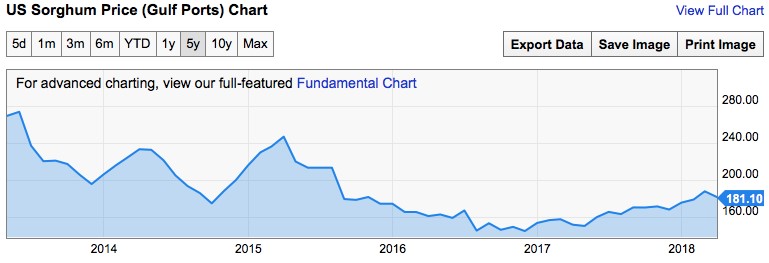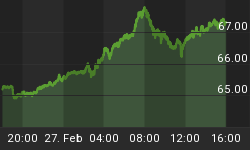The global grain glut is already killing commodity prices, and while the latest Chinese efforts to tame Trump hit at sorghum imports, if corn and soybeans are next, trade is in trouble and farmers have every reason to be worried.
Hours after China announced anti-dumping deposits on imports of U.S. sorghum, five ships carrying cargoes to China turned around mid-voyage, according to an exclusive Reuters report, and it could mean that sorghum is no longer profitable to deliver.
As of Thursday, Reuters reported 20 ships carrying over 1.2 million tonnes of U.S. sorghum worth $216 million on the waters, and a least five of those ships turned around after Beijing announced that importers would have to pay a whopping 178.6-percent deposit on the value of each shipment, possibly rendering them unprofitable.
The deposit, which went into effect Wednesday, is a temporary anti-dumping measure from Beijing, which claims that U.S. grain has damaged China’s domestic industry. The deposit is being viewed as a ‘duty’.
A final ruling will be issued by Beijing at a later, unspecified date.
In the meantime, U.S. sorghum exporters appear to be recalling shipments and hoping that the deposit is truly temporary.
According to Reuters, the five shipments that appear to have turned around were loaded at Texas Gulf Coast export terminals owned by grain merchants Cargill Inc or Archer Daniels Midland Co—two of the world’s largest.
AMD did not respond to Reuters’ request for comment, while Cargill issued a statement confirming it is the exporter but declining to confirm why the ships were stopped and whether they were being re-directed. Interestingly, Cargill noted that it bears no responsibility for any costs incurred as a result. Related: The Next Housing Crisis Could Be Right Around The Corner
Bill Densmore, senior director of corporate ratings at Fitch Ratings, told Reuters that in the bigger picture, the halting of these five sorghum shipments is not a major setback, but it should be viewed as a “warning” of what might come next.
“If China really does start slapping tariffs on everything, like soybeans and corn, things could get really ugly, really fast,” Reuters quoted Densmore as saying.
The situation is dire enough to prompt agricultural economist Mark Welch, of Texas A&M University, to warn that “basically, this will shut off grain sorghum exports to China for the United States”.
And replacing the Chinese market for U.S. sorghum is easier said than done. Last year, the Chinese purchased over 90 percent of America’s 245 million bushels of sorghum exports.
Indeed, in the tit-for-tat tariff battle, the prices of soymeal and rapeseed meal used in animal feed have already spiked on the news, and on growing concerns that China could target soybeans, corn and other agricultural products.
And what is a hit for U.S. sorghum is a boon for others who aren’t subject to the anti-dumping deposit. Australian sorghum saw bids for its cargoes soar, says Reuters, as a result of Tuesday’s announcement by Beijing.
U.S. sorghum prices at the Texas Gulf are now at a one-month low. As of Thursday, in the Texas High Plains grain markets, the bulk of bids were mostly 1 to 2 cents lower on grain sorghum and corn, while wheat bids were mostly 6 cents higher. Related: Geopolitical Tensions Fail To Boost Gold Prices
For March, U.S. sorghum prices were down to $181.10, from $187.36 in February, over trade war concerns.

(Click to enlarge)
The real bogeyman here is soybean exports, though. Sorghum, is just a testing ground for Beijing, and a negotiating tactic, Trump style.
But the U.S. does $14 billion in soybean trade with China and China buys up about half of U.S. exports of the grain. Beijing is mulling a 25-percent tariff.
"The Chinese are very clever here," Keith Bliss, a trader for the brokerage firm Cuttone & Co., said on CNBC's "Closing Bell." "They knew that they were going to hit right to the heart of Trump's base of support in the Midwest."
By Fred Dunkley for Safehaven.com
More Top Reads From Safehaven.com:
















